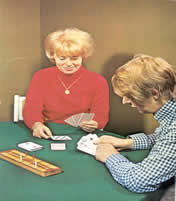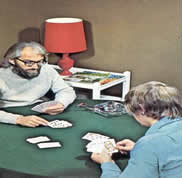Pokerwebpages.com → Games of Playing cards
Boston Whist
Boston Whist, or more simply Boston, is a variation of solo whist that, though an excellent game, is not as popular as the parent game because the scoring is rather complicated.
The game is for four players playing all against all, and the cards are dealt to each player in bundles of four-four-five. The player who faces the dealer cuts another pack of cards: the top card of the lower part of the pack determines what is known as the First Preference, and the other suit of the same color is known as the Second Preference. The other two suits are known as the Plain Suits.
The player on the left of the dealer bids first. Each player bids in turn, and bidding continues until three players in their turn pass a bid. A player must make a higher bid than the previous one, and once a player has passed he cannot re-enter the bidding except to bid a Misère or Spread that is superior to the previous bid.
A player has the choice of fourteen bids, namely:
Pass.
Bostron – A contract to win five tricks.
Six- A contract to win six tricks.
Seven- A contract to win seven tricks.
Little misère- A Contract to lose twelve tricks after discarding a card which is not shown.
Eight- A contract to win eight tricks.
Nine- A contract to win nine tricks.
Grand Misère- A contract to lose all thirteen tricks.
Ten- A contract to win ten tricks.
Eleven- A contract to win eleven tricks.
Little Spread- A contract to lose twelve poker tricks after discarding a card which is not shown, and the remaining cards exposed on the table.
Twelve- A contract to win twelve tricks.
Grand Spread - A contract to lose all thirteen tricks with the cards exposed on the table.
Grand Slam- A contract to win all thirteen tricks.
In this list any call is superior to any above it and, apart from the miseries (which are played without a trump suit) a bid in first preference takes precedence over one in second preference, and one in second preference takes precedence over one in a plain suit.
When a player makes a bid he does not name the denomination. He merely says ‘Boston’, ‘Six’ ‘Seven’, as the case may be. If a second player thinks that he can make the same number of tricks in the second preference he says ‘I keep’, and if a third player thinks he can make the same number of tricks in the first preference he says ‘I keep over you’.
When the final bid has been made, the declarer names the trump suit and the player on the left of the dealer leads to the first tricks. The object of the game is for the declarer to win his contract, and the other three players to try and prevent him from doing so. As is routine in poker games of the whist family, a player must follow suit to the card led, if he can, and if he cannot he may trump or discard.
The winner of a trick leads to the next.
Before the start of a deal the players put on an agreed amount into a pool.
If a player makes his contract he receives from each of his opponents the number of units shown in the following table, and, if his contract was for Seven or higher, he takes the pool.
|
Number of Tricks actually won |
||||||||
Number of tricks contracted for |
5 |
6 |
7 |
8 |
9 |
10 |
11 |
12 |
13 |
Boston, 5 |
12 |
12 |
13 |
13 |
14 |
14 |
14 |
15 |
15 |
Six |
|
15 |
16 |
16 |
17 |
18 |
19 |
20 |
20 |
Seven |
|
|
18 |
20 |
21 |
22 |
23 |
24 |
26 |
Eight |
|
|
|
23 |
24 |
26 |
28 |
29 |
31 |
Nine |
|
|
|
|
32 |
34 |
36 |
39 |
41 |
Ten |
|
|
|
|
|
42 |
45 |
48 |
52 |
Eleven |
|
|
|
|
|
|
63 |
68 |
72 |
Twelve |
|
|
|
|
|
|
|
106 |
114 |
Thirteen |
|
|
|
|
|
|
|
|
166 |
In America the practice is to ignore overtricks. This is superior because it simplifies the scoring and leads to more skillful play as a player has to bid the full value of his hand to poker score sheet the maximum.
The scoring is:
For Boston (5) = 10
Six = 15
Seven = 20
Eight = 25
Nine = 35
Ten = 45
Eleven = 65
Twelve = 105
Thirteen = 170
If a player fails to make his contract he doubles the amount in the pool, which is carried forward to the next deal, and to each of his opponents he pays the number of units shown in the following table.

PLATE 11 (opposite) A two-handed game of cribbage being played.
Scores are ‘pegged’ on the standard cribbage or noddy board in the foreground.

PLATE 12 (opposite) A game of piquet in progress.
|
Number of Tricks by which a player Falls short of this contract |
||||||||||||
Number of tricks contracted for |
1 |
2 |
3 |
4 |
5 |
6 |
7 |
8 |
9 |
10 |
11 |
12 |
13 |
Boston, 5 |
10 |
20 |
30 |
40 |
50 |
|
|
|
|
|
|
|
|
Six |
15 |
25 |
35 |
45 |
55 |
65 |
|
|
|
|
|
|
|
Seven |
20 |
30 |
40 |
50 |
60 |
70 |
80 |
|
|
|
|
|
|
Eight |
25 |
35 |
45 |
55 |
65 |
75 |
85 |
95 |
|
|
|
|
|
Nine |
35 |
45 |
55 |
65 |
75 |
85 |
95 |
105 |
115 |
|
|
|
|
Ten |
45 |
55 |
65 |
75 |
85 |
95 |
105 |
115 |
125 |
135 |
|
|
|
Eleven |
70 |
80 |
90 |
100 |
110 |
120 |
130 |
140 |
150 |
160 |
170 |
|
|
Twelve |
120 |
130 |
140 |
150 |
160 |
170 |
180 |
190 |
200 |
210 |
220 |
230 |
|
Thirteen |
180 |
190 |
200 |
210 |
220 |
230 |
240 |
250 |
260 |
270 |
280 |
290 |
300 |
In Misères and Spreads the declarer wins or loses to or from each player as under:
Little misère = 20
Grand Misère = 40
Little Spread = 80
Grand Spread = 100
The deal circulates clockwise, and by custom, between deals the pack is cut to the dealer, without shuffling, by his right-hand opponent.
